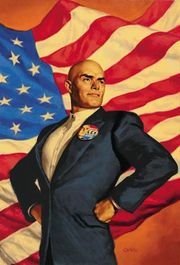
I shoot at you actors
Like movie directors {*ha ha*}
This ain't a movie dog
It’s Monday, bleh. Work is a bear. Bleh. And the Eagles AND the ‘Canes lost this weekend. Bleh-Bleh. The good news? Those Fightin’ Phillies! Yeah! Oh, and I’m back on schedule. Yeah! The week’s looking up!
So for those who don’t know, I am a film buff. And being a “buff” means that my movie watching isn’t just relegated to the classics -- Terminator 2 and The Empire Strikes Back – it also requires that I watch movies made before the Golden age of film-making of 1978-1992 (C’mon, you have Conan the Barbarian, Star Wars, Empire, Star Trek II , New Jack City, Goodfellas, Scarface, Wallstreet, Top Gun, JFK…all made during this time period! And this is an “unofficial Top Ten list” digression).
So, I Netflixed the worlds first feature length movie, “The Birth of a Nation.” I gotta tell you, as nutty as the “Black Power” crowd can be at times, one needn’t do much more than watch this movie to see where it comes from. But, then I am getting ahead of myself.
To fill the (bliss-fully) unaware of you in, Birth of a Nation is the crowning achievement of D.W. Griffith, a filmmaker who was making short movies at a rate of one a week. In 1915, when Birth was made, movies typically ran less than 20 minutes, with the longest running just 1 hour. Griffith’s movie eclipsed all that preceded it, running just over 3 hours. Griffith was also the first to employ camera close-ups and several other film innovations still used today. In short, it is a technical masterpiece.
But, it is also so socially appalling as to offend my conscience. And trust me true-believers, it takes ALOT to offend my conscience, such as it is. The movie tackles the defining American topic, race – in a way that only a film made in 1915 could.
SPOILER ALERT (FOR THOSE DIE HARDS THAT HATE TO HAVE MOVIES RUINED)
Birth of a Nation explores the Civil War, and concludes – in the opening moments of the film – that “The bringing of the African to America” would start the nation down a disastrous path. Essentially, it is the tale of two families, one quaint Southern gentry, and the other, progressive Northern liberals. Egged on by the well-intentioned but stupid abolitionists, a Northern politician pushes for freedom for the slaves. Southerners, who after all, have a “quaint” if not peculiar way of life become incensed when the Northerners seek to “reform” their way of life. After all, such refrains are restraints of their liberty, and lord knows, life isn’t worth living if man cannot be free.
After a few devious moves by clever, yet evil, mulattoes (the REAL enemy), the inevitable war takes place, with the noble Southerner falling to Northern aggression. And that’s only the first 90 minutes. Because now, we’ve got reconstruction.
Reconstruction dawns with the enslavement of the noble white southerner to his newly freed Negro. Negroes vote. Negroes serve in the state legislatures and a mulatto (the REAL enemy) becomes the Lt. Governor of South Carolina.
Then the worst thing happens – Negroes want to marry white women! Oh, the humanity!
Well, another 60 minutes (and one attempted rape of a white woman) later, the hero has had enough. Seeing that Negroes are afraid of ghosts, he fashions a white bed sheet and grabs a gun. He raises an army of fellow “Aryans” (the movie uses the term) and rides to the rescue of yet another white woman who is being forced to marry a *gasp!* mulatto.
Yada yada yada, a whole lotta Negroes flee (with ‘dem dere big eyes we’s have boss!) and the day is saved. The world is safe, and whiteness is restored. (You gotta love the scene on voting day when mounted clansmen stand between the freedmen and the polls. Makes voting in November downright pro-black! Sonny “Vote-or-die/the ballot or the bullet!”Redd.)
Bleh. I don’t know who is more universally hated, us or the Jews. I can’t really call it. Though it’s close.
Upon seeing Birth, then President Woodrow Wilson commented that “it’s all so terribly true.” Birth chronicled developments that the movie asserts changed the Nation from a confederation (pun-me? Never!) of independent states to a united nation. That (other than the latent inferiority of the Negro) is the message of the movie, and why its name was changed from “The Clansman” (the name of the book – yes book – it was adapted from) to “The Birth of a Nation.” Well, that and white supremacy. (Oh, yeah!)
But Birth is actually responsible for the emergence (or re-emergence) of the Klu Klux Klan, in 1915. In fact, at the height of its membership, the Klan boasted 4 million (mostly Republican) members. To put that figure in perspective, there were only 31 million men over 18 in the entire country at the time. Suffice it to say, this movie certainly impacted the country.
Ironically one thing is sure, whatever America is today, whatever she ever was, Black America was and is a part of that. We’ve been on her mind since the beginning, and even though the Mexicans get a lot of print these days, we’re still on her mind. Shit, it’s like America is Flava Flav, and we’re New York! It’s okay though, like New York, I love this place, even with its apparent unsexiness.
I encourage all of you to see this movie. I guarantee, you won’t be the same.










